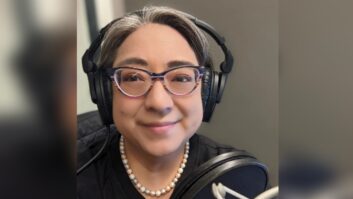Perhaps the months or years ahead will bring change to this situation; but as of the end of 2016, the death of Fidel Castro in November had not lessened the Cuban government’s hostility to outside broadcasters, any more than the restoration of U.S.-Cuban diplomatic relations did on July 20, 2015.

Malule González
If anything, the Cuban communist regime’s antipathy to Radio and TV Martí — the U.S. government-funded, Cuba-targeted broadcaster based in Miami — and to WRMI Radio Miami International — the commercial shortwave broadcaster that leases airtime to Cuban resistance groups — seems to have grown.
“For a period of time, the Cuban government was ‘overlooking’ the distribution of flash drives and DVDs containing our content in Cuba by Cuban citizens,” said Malule González, director of the Office of Cuba Broadcasting, operator of Radio and TV Martí. “But, recently, they have been cracking down on distributors of ‘el paquetes,’ as these devices are called by Cubans. If anything, the repression has worsened in the past two years, not improved.”
SO CLOSE, SO FAR
It is just 228 miles by air between Havana and Miami, just 14 more than flying between Miami and Orlando. Only 90 miles separate Cuba from the Florida Keys.
But for Radio/TV Martí and WRMI, getting their signals through is a constant challenge: The island has been operating radio and TV jamming antennas for decades. (See a related article from March 2015 at radioworld.com/cuba.)
“We have been jammed by the Cuban government almost since we started broadcasting in 1989,” said WRMI General Manager Jeff White. “And despite the closer relations now between Cuba and the U.S., the level of jamming has not diminished at all. It’s a disgrace that the Cuban regime will still not allow its people to hear programs from abroad that the government doesn’t like: Freedom of expression is still not on their agenda.”
Yet despite this fact, some U.S.-based broadcasters are getting through. “Based on the SMS messages and phone calls we receive from Cuban listeners and viewers, we know that our Radio and TV Martí is being received,” said González. “We get emails as well.”
TUNING IN
Radio Martí began broadcasting from the United States to Cuba in 1985. Television Martí was launched five years later. Radio/TV’s mission is to deliver news, current affairs and entertainment/lifestyle programming that doesn’t toe the Cuban communist line. Small wonder that the Cuban government has done its best to block the service — and why Radio/TV Martí has been and is using every mix of over-the-air satellite, online and physical media distribution to get by them.

WRMI antenna farm aimed at Cuba.
“No matter what they do, we manage to get through,” said González. “The Cuban people are tuning into Radio/TV Martí, and we have the feedback to prove it.”
WRMI’s Cuban programming mix is based on whatever content its airtime buyers choose to put on air. It’s a longstanding relationship: “Radio Miami International began acting as a broker for Cuban exile programs on shortwave to Cuba in 1989, transmitting from various shortwave stations in the Dominican Republic and the United States,” said White.
In 1994, WRMI launched its Miami-based SW station. Its transmission power and reach were boosted greatly in 2013, when the broadcaster bought the expansive SW transmission farm belonging to now-defunct Family Radio in Okeechobee, Fla.
Over the years, most all of the major — and many minor — Cuban exile organizations have used WRMI’s facilities to broadcast programs to Cuba. In fact, “at one time, Cuban exile programs made up the majority of our programming,” said White.
The number of Cuban exile-produced shows coming over WRMI has dropped substantially over the years, but not due to anything done by the Castro regimes (Fidel then and Raul now). “Over the years, many of the Cuban groups in Miami have gone out of existence, or don’t have funding to continue their broadcasts,” said White. “And frankly, many of the Cuban exile leaders have been dying off, and the younger generations generally are not very interested in Cuban politics.”
The result? “Today Cuban programming makes up only a small percent of our programming.”
LIMITED ACCESS
The U.S.-Cuba diplomatic thaw and the death of Fidel Castro have not lessened Cuban communist resistance to outside broadcasters. And as of this writing, any impact of the Trump presidency remains to be seen.
So what will it take to alter the situation?
According to González, nothing less than the introduction of free speech will do, and that will only happen with regime change.
Jeff White agrees: “Honestly, I think it will take a major political change on the island: Certainly it won’t happen as long as Raúl Castro is in power,” he said. “But they would also have to make a major change like allowing free elections and freedom of expression.
“Maybe that would also put an end to the Cuban exile programming we broadcast; I don’t know,” White added. “But it would be a major victory for the Cuban people, and it would show in a way the important role that shortwave radio programs have played in bringing about a change in Cuba.”
Ann Noonan, executive director of the advocacy organization Committee for U.S. International Broadcasting, said that, although Cuba is becoming a tourist destination for many Americans again, “Little or no help has been offered to most of Cuba’s people, who are still desperately poor. Access to communication is limited for families in Cuba.” She said that because all media inside Cuba are still controlled by the state, “shortwave and medium-wave radio broadcasts from the United States remain crucial for access to news inside Cuba. Radio and TV Martí need more support and funding for their work.”
Even if President Trump reinstates an embargo on Cuba, she said, “It seems unlikely that it would make any difference in the lives of many Cubans. Right now, for the most part, the only ones who are benefiting from the end of the travel restrictions are elitists inside Cuba and Americans who romanticize about life there and want to go there to see old cars, import cigars and enjoy the beach.” CUSIB, she said, is hopeful that the Trump administration will push for greater funding to the Office of Cuba Broadcasting.







